| Historical Dictionary of Turkmenistan Contributor(s): Abazov, Rafis (Author) |
|
 |
ISBN: 0810853620 ISBN-13: 9780810853621 Publisher: Scarecrow Press OUR PRICE: $130.68 Product Type: Hardcover Published: December 2004 Annotation: Provides a concise overview of the historical development of Turkmenistan. The introduction and chronology provide a summary of the Turkmen history, focusing on the 20th century, political and economic development, ethnic policies, and nation building. This is the first comprehensive reference book published in English that provides comprehensive up-to-date details about the contemporary history, economy, and culture of Turkmenistan. The dictionary consists of approximately 300 entries and is cross-referenced to make sure that it is easy to use by international consultants, NGO activists, policy makers, experienced scholars, or students interested in a history of the country. The substantial bibliography helps readers to find materials and resources in specialized subject areas. |
| Additional Information |
| BISAC Categories: - History | Asia - Central Asia - History | Middle East - General - History | Reference |
| Dewey: 958.500 |
| LCCN: 2004016829 |
| Series: Historical Dictionaries of Asia, Oceania, and the Middle Eas |
| Physical Information: 0.91" H x 6.84" W x 8.5" (1.16 lbs) 344 pages |
| Themes: - Cultural Region - Middle East - Cultural Region - Eastern Europe - Cultural Region - Russia |
| Descriptions, Reviews, Etc. |
| Publisher Description: Turkmenistan is known for its huge oil and gas resources, as well as for the rich, complex, and captivating history of the Turkmen people. For centuries they were known as skillful and courageous warriors who left deep marks in the histories of other countries, such as India, Russia, Afghanistan, Turkey, Iran, Iraq, and Egypt. As craftsmen, they constructed extraordinary architectural monuments, whose ruins can be found all over the country, and famous Turkoman carpets are still highly valued in many parts of the world. Yet, for centuries, foreign invaders and local tribal conflict plagued the land with wars that devastated the Turkmen society and destroyed its magnificent but fragile oases. In the late 19th century, the Turkmens witnessed the establishment of the Russian Empire in their lands. In the years following, these lands were united by the Soviet government into a single political entity in an attempt to force the Soviet style nation-state building and socio-economic transformations. In 1991, the Turkmen parliament voted for the country's independence and promised to build a sovereign state capable of bringing prosperity and social and political stability to the society. The reality, however, proved to be more complex. After more than 15 years of independence, Turkmenistan still faces a number of difficulties, including economic and structural issues, security challenges, growing competition between various clans, and widespread poverty. Historical Dictionary of Turkmenistan provides a concise overview of the historical development of Turkmenistan. The introduction and chronology provide an overview of the Turkmen history, focusing on the history of the country in the 20th century, political and economic development, ethnic policies, and nation building. This is the first comprehensive reference book on Turkmenistan published in English that provides comprehensive up-to-date details about the contemporary history, economy, and culture. The dictionary consists of approximately 300 entries a |